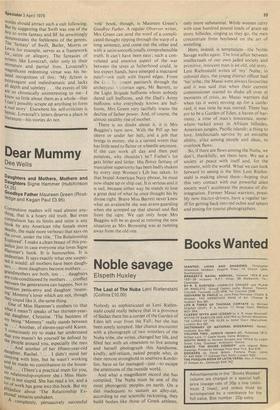Dear Mummy
Dee Wells Qoodbye Father Maureen Green (Rout- ledge and Kegan Paul £3.95) Compulsive readers will read almost any- thing, that is a hoary old truth. But even c,_°MPulsion has its limits and mine is any nook by any American (the female more deadly, the male more verbose) that says on the cover, under the title, 'The Relationship Explored'- I make a clean breast of this pre- Judice just in case everyone else loves Signe Hammer's book. It is humourless. It is Pedestrian. It says exactly what one suspec- ted it would: all mothers have been daugh- ters • .. most daughters become mothers ... grandmothers are both, too . . . daughters are role-conditioned by mothers ... conflict between the generations can happen. Not to mention penis-envy and daughter 'resent- ing' Mommy's lover which are not, though they sound like it, the same thing. One of Miss Hammer's mothers (is that What mean?) speaks of her thirteen-year- °Icl daughter, Christine. 'The business of My being "Mommy" really stands between ,'s • Another, of eleven-year-old Karen. consciously try to make her understand that you mustn't let yourself be defined by the People around you, especially the men And another of her fifteen-year-old u,aughter, Rachel. . . I didn't mind her sIcePing with him, but he wasn't working and he made no contribution to the house- h Old • • 2 (There's a practical mum for you, no relationship-explorer she.) Miss Ham- lot mer not stupid. She has read a lot, and a of work has gone into this book. But my 1:!eJtidice about 'The Relationship Ex- Plored' remains unshaken. A completely, persuasively successful 'role' book, though, is Maureen Green's Goodbye Father. A regular Observer writer, Mrs Green can send the woof of a compli- cated thought zipping through the warp of a long sentence, and come out the other end with a satin-smooth totally comprehensible truth. It can't have been easy; such a con- voluted and emotive aspect of the war between the sexes as fatherhood could, in less expert hands, have emerged a macrame patchwork quilt with frayed edges. From the 0,,i Te ,ament patriarch through the archetypal \ ictorian ogre, Mr Barrett, to the Light Brigade buffoons whom nobody dared call buffoons, and the Dad's Army buffoons who everybody knows are buf- foons, Mrs Green very tactfully traces the decline of father power. And, of course, the almost stealthy rise of mother.
There is no doubt about it, it is Mrs Buggins's turn now. With the Pill up her sleeve or under her belt, and a job that brings in money, she is a turned worm that has little need to flatter or wheedle anymore. If she can work all day and then peel potatoes, why shouldn't he? Father's lot gets littler and littler. His flimsy fantasy of masculine superiority has been badly shaken by every step Women's Lib has taken. In that brutal American Navy phrase, he must now shape up or ship out. It is serious and it is sad, because either way he stands to lose a great deal of what he once thought his by divine right. Brave Miss Barrett never knew what an avalanche she was avant-guarding when she scooped up that spaniel and fled from the ogre. We can only hope Mrs Buggins will be as good at running the new situation as Mrs Browning was at running away from the old one.


































 Previous page
Previous page